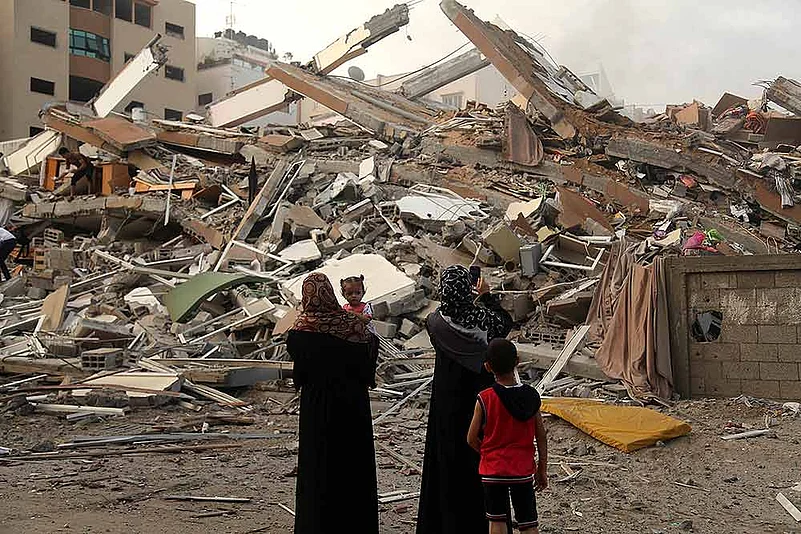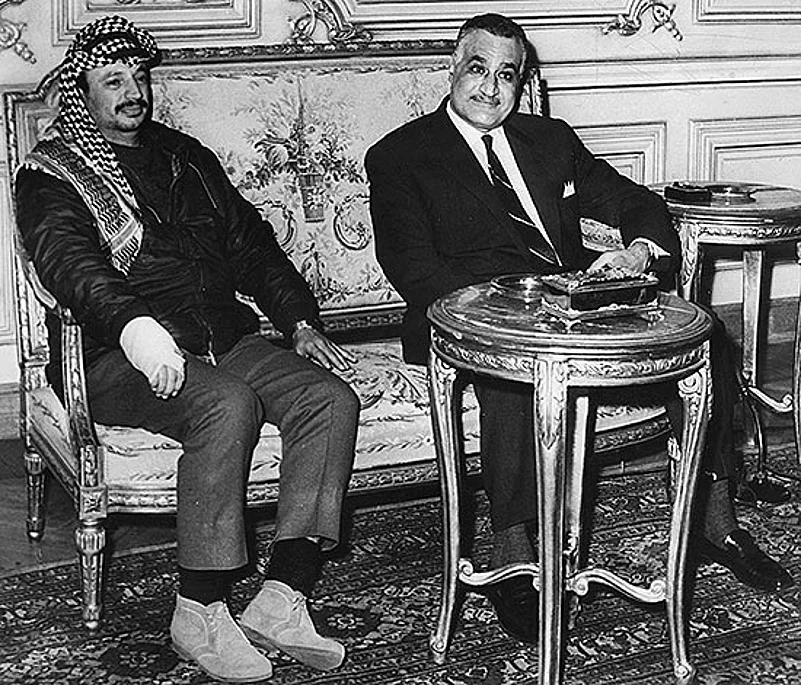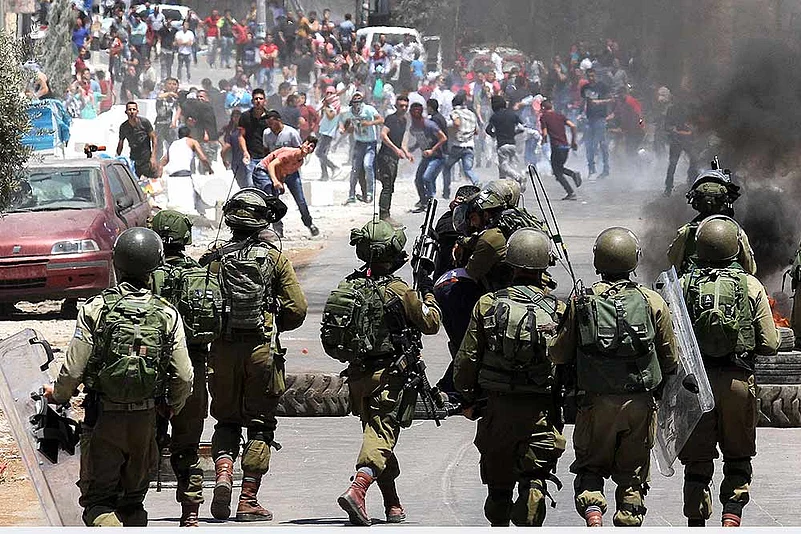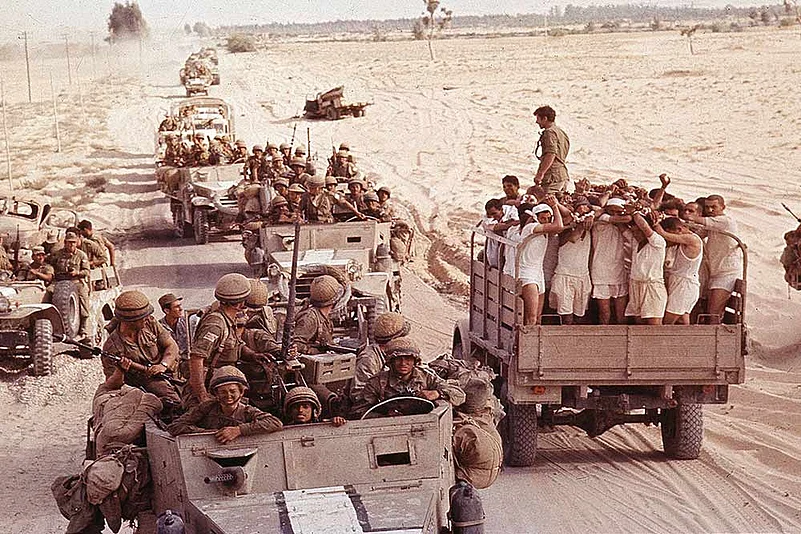An Early Clash
- Before the Six-Day War was the seven-day war—the 1956 Suez War between Egypt and Israel. Harassed by Jordan on the east and Egypt in the West, and backed by England and France amid the Suez crisis, Israel struck in Sinai on Oct 29, stunningly overrunning it by Nov 5. A UN ceasefire ended hostilities.
***
Fifty years ago, in early June, in just six days, the Israeli armed forces destroyed the armies of the neighbouring Arab states. This victory ended for all time any possibility of the Jewish homeland being obliterated by its dispossessed Semitic kinsmen, the Palestinians, on whose territory this homeland had been forcibly erected. The Arabs refer to the creation of Israel and the defeat of the Arab armies in 1948 as the Naqba, ‘Catastrophe’, and the 1967 defeat as Nasqa, ‘Setback’. But, in fact, the latter is the real catastrophe for the Arabs, the Israelis and for West Asia.
In 1967, no Arab leader really wanted war or was ready for it: as Israel skirmished with Syria and laid claim to all the waters of the Jordan river, Egypt’s Nasser was pressurised to live up to his image as the stalwart of Arab nationalism and confront the Jewish interloper in the region.
He peremptorily got the UN observers removed from the region, closed access to the Israeli port of Eilat, and, in an inflammatory speech on May 26, declared: “Our basic objective will be to destroy Israel”.
He projected a joint assault upon Israel by three Arab states—Egypt, Syria and Jordan—whose combined armies far outnumbered those of Israel. Israel did not wait for the attack: it launched a pre-emptive strike on June 5 that destroyed the air forces of the enemy states on the ground and then, with full mastery of the skies, wreaked havoc upon the ground troops.

June 1967 Israeli tanks plunge through the Sinai Desert during the closing stages of the Six-Day War
Today, we know how ill-prepared the Arabs were for war: there was, as Eugene Rogan has noted, no war planning or coordination, no joint strategy, and serious technical errors were made during the fighting that compounded Arab losses. Nasser truly believed that, for all his sabre-rattling, there would be no war as the US would intervene to negotiate a peace agreement, enabling him to declare victory, as had happened in 1956.
The Israelis were more clear-headed and more motivated. They wanted the unfinished business of the 1948 war to be taken care of with the conquest of all remaining territory of Mandatory Palestine to obtain secure borders and dictate peace terms. After the war, Israel controlled the West Bank, the Sinai, the Gaza strip, and the Golan Heights along the border with Syria. It also got the eastern part of Jerusalem, which it declared the unified and eternal capital of the Jewish state.
New era in West Asia
In the immediate aftermath of the war, while triumphalism swept Israel, the Arab world was plunged in humiliation and despair. The 1967 victory also bonded Israel with the US, putting in place a relationship that tied the US firmly with its Jewish ally, so that every part of the US political establishment across party lines—the White House, Congress, Pentagon, the CIA, business and media—perceived an identity of interests between the two nations.

A family before the rubble of their residence, destroyed by an Israeli airstrike, in Gaza City during the 2014 Gaza War
Though militarily the strongest power in the region, Israel successfully projected itself to be under an existential threat from its belligerent neighbours, secured massive US defence supplies and even obtained US sanction for the development of nuclear weapons. US policy backed the maximalist Israeli agenda; as Avi Shlaim has said, it was aimed at “dividing the Arabs, avoiding the core issues of the Arab-Israel conflict, and frustrating the search for a comprehensive settlement”.
Ironically, the war also pushed several Arab nations into the US embrace. The defeat shifted the balance of power among Arab states from the nationalistic, socialist and secular republics that had dominated Arab politics after the Second World War, in favour of the traditional monarchies, led by Saudi Arabia, that were more anchored in Islam and closely allied with the West in the ongoing Cold War. The monarchies came to depend on western powers for their security in a turbulent regional environment, and in turn backed the strategic interests of the West across the region.
This ‘natural alliance’ led to the US, Saudi Arabia and Pakistan sponsoring the jehad in Afghanistan in the 1980s, which then became ‘global’ after victory in 1988 in terms of the reach of jehadi veterans to perpetrate violence on their progenitors, culminating in the attacks of 9/11 in the US. The dispossession and humiliation of the Palestinians have been a powerful allure for young Arabs to join the jehadi cadres and have placed political Islam at the heart of the conflictual scenario in West Asia.
Besides the inclination of the monarchies in favour of Islam, the 1967 war caused what Albert Hourani has called a “disturbance of spirits”. The defeat was seen by several Arabs as divine retribution for their spiritual and moral deficiencies. There was now a widespread acceptance of the need to pursue a national path based on “inherited beliefs and culture” influenced by a regenerated Islam.
Shaping Palestinian identity
The war also had a powerful catalytic effect on the shaping of Palestinian identity and interests. The creation of Israel had deprived the Palestinians of their homeland and, in a manner of speaking, erased them as a people. They now commenced a struggle, both armed and diplomatic, in their own name.

Palestine Liberation Organisation chief Yasser Arafat with Egypt’s president Gamal Abdul Nasser
In 1974, the Arab League recognised the Palestine Liberation Organisation (PLO), with Yasser Arafat as its chairman, as “the sole legitimate representative” of the Palestinian people. This recognition culminated in the address at the UN General Assembly by Arafat in November 1974, described by a contemporary observer as “a moment of triumph for the disinherited”.
But the 1967 war ended the sense of Arab solidarity, centred around the cause of the Palestinian people. After the war of 1973, where Egypt regained a modicum of national honour, it broke ranks from its brethren and concluded a separate peace treaty with Israel, followed later by Jordan.
With the principal Arab power on its side, Israel saw no reason to respond to Palestinian aspirations. Since, due to their large Arab populations, Israel had no wish to annex most of the occupied territories (other than east Jerusalem and the Golan Heights), it followed a two-point policy: first, it expropriated large portions of the Arab lands and established Jewish settlements upon them, and, two, it made living conditions for the Palestinians so burdensome and humiliating that they would be compelled to leave their lands. In 1948, Palestinians owned 93 per cent of the land in Mandatory Palestine; after the 1948 war, their ownership was reduced to 25 per cent, while now it is four per cent.
Israeli messianism
The Israeli historian, Ilan Pape, has described Israeli occupation as “harsh and brutal”. The territories were defined as “under custody” where military law would apply, which meant expulsions, systematic harassment and collective punishments. But the most significant consequence of the 1967 triumph in Israel was the influence that religious figures and organisations came to enjoy in the country, mirroring the ascendance of faith-based politics in the Arab world.
The Israeli religio-political order was deeply influenced by messianism that has a significant place in the Abrahamic faiths. The revered Rabbi Zvi Yehuda Kook saw the land of Israel as “possessing unique mystical characteristics, which correspond with unique traits of the Jewish people”. Jewish religious leaders asserted that the 1967 victory marked the long-awaited redemption of the Jewish people, the “chosen people” of God, who had a divine claim to the “promised land” of Biblical Israel.
On this basis, they rejected the Madrid and Oslo accords based on “land for peace”, and one of their adherents, Yigal Amir, assassinated Prime Minister Yitzhak Rabin in November 1995, a month after he signed the Oslo II accord. This ended all serious attempts at peace-making by the Israeli leadership—a stasis that lasts till today.
The Intifida
Frustrated by their humiliating circumstances, the Palestinians first rose against occupation in 1987 and then in 2000. The 1987 Intifada (uprising), described as an “anti-colonialist movement” by Pape, led to widespread violence by Israeli security forces in which 400 Palestinians were killed in the first year and tens of thousands injured, mainly women and children, who were subjected to brutal beatings by Israeli police. Now, for the first time, sections of western opinion began to see Israel not as a beleaguered David, but as a Goliath.

Palestinians, showing solidarity with prisoners in Israeli jails, throw stones at soldiers in Nablus, in the West Bank
The second Intifada was deliberately provoked by then opposition leader, Ariel Sharon, when he defiantly strode through the Al Aqsa mosque. Unarmed Palestinian youth objected to this sacrilege and thirteen of them were promptly shot dead. This led to suicide bombings and massive retaliations, which included killings of scores of Palestinians.
A few years ago, Palestinian political activist Marwan Barghouti, himself in an Israeli jail, said that since 1967, as many as 6,50,000 Palestinians had experienced imprisonment in Israel, which was half of the adult male Palestinian population at that time. (The numbers have since crossed 8,00,000.) Pape points out that this mutual violence has destroyed the social and economic fabric of Palestinian society, while the Israelis experienced personal insecurity and erosion of their living standards.
Israel has sought sanctuary behind a wall, which protects even as it imprisons them. Eight metres high and planned to be 750 km long, this wall has affected 2,00,000 Palestinians who have been displaced or are unable to reach their farmlands. When completed, it will impact half the population of the West Bank, most of whom will become unemployed and homeless.
The violence continues unabated: in his report on the violence in Gaza in 2009, Justice Richard Goldstone spoke of collective punishments, progressive isolation and deprivation, signi-ficant trauma and “deliberately disproportionate attacks designed to punish, humiliate and terrorise a civilian population”.
Identities in conflict
In recent years, alarmed by the increasing influence of Iran in the region, Saudi Arabia and Israel have seen tactical advantage in working together against Iranian interests, signalling Israel’s acceptance of its destiny in the West Asian geographical space. But, this has not encouraged any new approach by Israel to address Palestinian aspirations. It believes, perhaps correctly, that the divided Arabs, mired in internecine competitions and confrontations, are unlikely to exert themselves to agitate for Palestinian rights.
This is a short-sighted view: as Shibley Telhami has pointed out, the issue of Palestine goes well beyond the short-term interests of Arab leaders; it is an integral part of the “collective Arab consciousness” in much the same way in which Israel is part of Jewish collective identity globally. David Shulman has noted that the occupation and particularly the settlements project “have profoundly eroded the moral fibre of Israel, corroded central institutions of society, and undermined our (Israel’s) integrity as a political community”.
Fifty years later, while the defeat of 1967 has changed little for the Arabs, who remain mired in disunity, despair and violence, Israel’s triumph has coarsened its national ethos and imbued it with cruelty and entrenched racist animosity, very reminiscent of the hate and violence the Jews had escaped from when they came from Europe to their ‘promised land’.
Talmiz Ahmad, A former diplomat, he holds the Ram Sathe Chair for International Studies, Symbiosis International University, Pune























